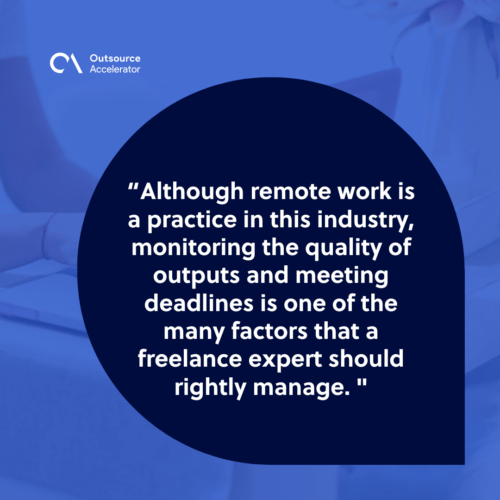How to start a freelancing business in 2025

The global challenges posed by the COVID-19 pandemic have made it difficult for businesses to sustain operations amid health restrictions aimed at preventing the spread of diseases.
The situation led many business leaders to explore other ways to stay resilient and ensure sound recovery amidst the pandemic, including hiring freelance workers.
As a corresponding effect, freelance experts take it as an opportunity to start a freelancing business using their knowledge in the industry.
They opted to build an empire and look for talents with different skills and specializations to help them accomplish tasks from client partners.
In 2022, Fiverr’s survey revealed that 78% of organizations will likely rely on freelance services this year because of the post-pandemic remote regulations. This is very evident with the increasing number of freelance workers worldwide.
Today, the question of how to look for a freelance job translates to how to start a freelancing business in 2024.
Basic requirements for setting up a freelancing business
Setting up your freelancing business is cheaper than having a traditional human resource agency.
Since everything is made accessible because of digital platforms, freelancing can now provide ways to connect with your target leads cost-effectively.
However, starting a freelancing business will require you the following basic requirements:
1. Knowledge of the freelancing industry
Understanding the freelancing industry and how it works is very important in a freelancing business.
Although remote work is a practice in this industry, monitoring the quality of outputs and meeting deadlines is one of the many factors that a freelance expert should rightly manage.
Having in-depth and first-hand knowledge is always a competitive advantage.

2. Proper equipment and softwares
As mentioned, freelancing supports many companies that conform to digital transformation. It accelerates operational strategy and helps them withstand the new normal after the post-pandemic.
A freelancing business requires primary tools for communications and office suits where the freelancing business owner can exchange updates and work outputs daily.
Among the long list of equipment and software needed for a freelancing business, here are the top essentials to consider:
- Computers and strong internet connections
- Office suites (e.g., Microsoft Office)
- Software application for monitoring and tracking
- Telephone and mobile phone
- Furniture (e.g., desk and chair)
3. Website or online platform
Another imperative way that answers how to start a freelancing business is to establish a consistent online presence. A skill in online marketing is a plus factor.
Architecting a user-friendly website or other digital marketing channels to showcase your brand, portfolio, and service offers will help attract clients.
It will also support you in reaching out to all potential freelancers who can be part of your online empire and help you accomplish as many tasks as possible.
The more freelance projects you accomplish the higher your income.
How to start a freelancing business in 7 easy steps
Once you have the basic requirements for a freelancing business, the next step is to determine how to start and operate it properly.
If you are an aspiring business venturer and planning to have your own freelancing business, these seven easy steps may help you:
1. Identify the services and field of specialization to offer
For a freelancing business, knowing your specialization and what services to offer will help you determine the right market for your lead generation.
Here are some of the most in-demand freelancing services for many businesses:
- Finance, human resource, and accounting services
- Web design and development
- Article writing and search engine optimization
- Editing and proofreading
- Virtual Assistant
- Branding and marketing services
- Graphic, photo, and video design
2. Establish and customize your online platform
Like other startup businesses, building your workplace before hiring personnel and starting operations is necessary.
It is an advantage for freelancing businesses to know how to start and customize their online platform. It serves as your online space where potential clients can visit and review your firm after an initial coordination.
3. Perform a powerful lead generation
A powerful lead generation is a significant factor in building direct connections with potential clients. The chance to talk or set an appointment with the heads of the organization is a perfect opportunity to introduce your services.
There are many ways to do marketing and it is not limited to sending proposals via email. Today, it comes in various ways, like telemarketing, social media engagements, and digital marketing.

4. Supervise your project
Once a contract or project from a client is secure, it is necessary to apply systematic and comprehensive supervision.
Setting timelines and project plans can ease and lessen the risks or challenges that may occur, particularly the quality of work outputs and meeting deadlines.
5. Nourish your skills and hire additional freelancers
In a freelancing business, your clients’ demands can teach you how to unlock your full potential. Always nourish every piece of knowledge as an additional asset that makes your business more credible.
As your company grows, the number of clients and demands also increases. Hiring more freelancers is a recommended solution when projects are pouring in and additional commissions are gained in return.
6. Create a catchy and detailed portfolio
Testimony and great reviews are what make a freelancing business more credible. Remember that some companies are setting project costs based on the number of freelancing firms’ successful projects.
Most companies today conduct background checks to identify the potential of a freelancing business. A good reputation from verbal testimonies and reviews online will leave a good impression.
7. Amplify good business-client relationship
The key to longer projects and client recommendations is to amplify a solid business-client relationship. Earning client trust by performing exceptional service always results in an excellent customer experience.
Considering the nature of freelancing services, most of the time, the companies have lesser interaction and engagement since most employees perform tasks remotely.
Promoting good relationships by sending updates on the progress of your tasks and consistent communication is a must.
Tips for effective freelancing business
Here are some tips to help you maintain a strong client relationship:
All clients are equally important
One of the secret ingredients of a successful business is performing excellent service all the time.
In a freelancing business, there is no such thing as a small or big client. Treating all of them as part of your growing network is deemed beneficial.
Remember that a single client, regardless of the company size, can bring hundreds of potential leads by just recommending services.
Explore partnerships and collaboration
Technological advancements have boosted business systems and processes worldwide. In freelancing, there is a significance in knowing how to start expanding your reach through partnership and collaboration.
One of the mediums that a freelancing business may consider is to connect with an online marketplace for outsourcing.
It helps an organization to directly communicate with target leads, like outsourcing business processes to support business growth.
Partner with trusted and dedicated freelancers
Part of your business expansion is the possibility of hiring additional freelancers who will help you accomplish tasks from various clients.
Although many freelancers are looking for jobs worldwide, always remember to do a background check and screen your potential hires comprehensively.
The efforts in looking for dedicated freelancers will reflect the kind of output they provide to your clients. The main goal is to provide exceptional results with less supervision.

The role of freelancing in the evolving outsourcing industry
Freelancing and outsourcing have evolved over the years and transpired as a new framework for onshore and offshore service delivery. Both of them center on elevating the gains of online work services.
Though there are differences between freelancing and outsourcing, its common denominator to perform tasks and help companies to be more productive makes them interconnected.
Most freelancers today are managed by service contractors and sometimes connected to an online marketplace to gain more possibilities for dealing with a new client.
Today, the outsourcing industry continues to soar high as more and more freelancing businesses are opting to carve a name in the global market.







 Independent
Independent




